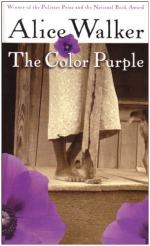|
This section contains 7,539 words (approx. 26 pages at 300 words per page) |

|
SOURCE: Ross, Daniel W. “Celie in the Looking Glass: The Desire for Selfhood in The Color Purple.” Modern Fiction Studies 34, no. 1 (spring 1988): 69-84.
In the following essay, Ross employs psychoanalytic methods to analyze Celie's delayed emotional growth in The Color Purple and examines the catalysts that shape and encourage her progress toward self-realization and self-acceptance.
For many readers the turning point of Alice Walker's The Color Purple occurs when Celie, the principal character, asserts her freedom from her husband and proclaims her right to exist: “I'm pore, I'm black, I may be ugly, and can't cook. … But I'm here” (187). Celie's claim is startling because throughout her life she has been subjected to a cruel form of male dominance grounded in control over speech. The novel's very first words alert us to the prohibition against speech served on Celie by her father: “You'd better not never tell nobody but...
|
This section contains 7,539 words (approx. 26 pages at 300 words per page) |

|


